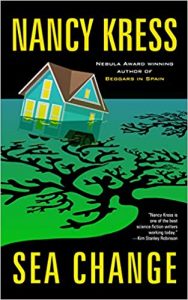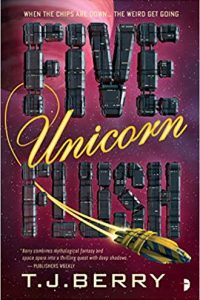Russell Letson Reviews Sea Change by Nancy Kress
 Sea Change, Nancy Kress (Tachyon 978-1-61696-331-6, $15.95, 191pp, tp) April 2020. Cover by Elizabeth Storey.
Sea Change, Nancy Kress (Tachyon 978-1-61696-331-6, $15.95, 191pp, tp) April 2020. Cover by Elizabeth Storey.
After a string of novels involving aliens, star-travel, deep time, and exotic physics, Nancy Kress returns to the near future, the thriller format, and the biological science issues that drove some of her work of the 1990s. Her new novella, Sea Change, sets its present action in the Pacific Northwest only a dozen years from now, in a troubled America shaken by the effects not only of climate change but of an unexpected Catastrophe that generated a public reaction against genetic experimentation and a government response more severe than the post-9/11 security crackdowns, with an entire new agency, the Department of Agricultural Security doing the cracking. But there is a reaction to the reactions, in the form of an underground organization, the Org, that is continuing to work on genetic-technology solutions to the problems of feeding an increasingly hungry planet.
In the book’s 2032 present-action main line, Renata Black is working for the Org as a courier, part of the communication infrastructure that holds the otherwise isolated research cells together. Computational and communication technologies have advanced enough to support autonomous cars and even smarter smartphones, but those technologies also support an enormously more effective surveillance state, which means that an underground outfit has to revert to very old techniques and protocols to stay out of reach of the authorities. Thus much of the thriller side of the story details the cell structure of the Org and how Renata and her colleagues maintain communication and research activities – and what happens when there seems to be a mole in the outfit. Apart from the need to avoid specific high-tech capabilities of the authorities (retina scans, DNA tracing, computer and phone tracking), most of Renata’s covert activities would fit right into one of, say, Alan Furst’s 1930s espionage novels – dead drops, forged IDs, need-to-know limitations, edible messages.
The science-fictional side is not that far-out, either: a hard-edged 21st-century cautionary tale of unintended consequences and the fragile, interlocking complexities of climate, biosphere, agricultural systems, and civilization. The full details of the Catastrophe are withheld until almost halfway through the book, but the effects are everywhere to be seen as Renata makes the rounds of her small slice of the Org’s secret labs and meeting places. Seattle is “full of sharp contrasts”: the “tech rich” and “shrinking middle class” comfortable and well fed, while “everybody else, made jobless and homeless by automation, survived on cheap, starchy food donated by agribusinesses, who were reimbursed by governments.” Eastern Washington is becoming even drier, heading toward desert. The Org’s researchers are treated like terrorists by the DAS and public alike, but their focus is on developing crops that can survive drought or salt water, that can deliver more nutrients (for example, genemod carrots) or prevent toxic algae blooms.
The book fits in with a number of recent unhappy near-futures that have been disturbing my sleep: Christopher Brown’s Rule of Capture, Cory Doctorow’s Walkaway, Karl Schroeder’s Stealing Worlds. But Sea Change is not only about how the wounded world of 2032 came to this pass, but how a middle-aged woman wound up with a secret life as a courier for an outlawed underground organization. Renata’s story reaches back into the twentieth century and a life of activism, stormy romance, a ruined marriage, stubborn independence, and grief. Nor does she work only with the Org. Her day job as a paralegal involves her in domestic-abuse and sex-crime cases in a native American community whose tribal lands are threatened by rising sea levels. The personal, secret, and legal-service parts of her life intertwine through both the present and antecedent actions, so that Renata’s biography becomes as intriguing as, say, the intrigue surrounding the Org.
Sea Change includes plenty of old-fashioned science-fictional didaxis – the actuality of the threat of biological disaster, the how and why of ecological change, the machineries of political and social panic and crackdown, the dueling protocols of underground movement and law-enforcement agency. There’s even a molecular diagram of a neurotoxin to accompany the account of how it’s generated in algae blooms. But the book kicks harder because we see and feel the impact of these processes on a whole life, close-up.
Russell Letson, Contributing Editor, is a not-quite-retired freelance writer living in St. Cloud, Minnesota. He has been loitering around the SF world since childhood and been writing about it since his long-ago grad school days. In between, he published a good bit of business-technology and music journalism. He is still working on a book about Hawaiian slack key guitar.
This review and more like it in the February 2020 issue of Locus.
 While you are here, please take a moment to support Locus with a one-time or recurring donation. We rely on reader donations to keep the magazine and site going, and would like to keep the site paywall free, but WE NEED YOUR FINANCIAL SUPPORT to continue quality coverage of the science fiction and fantasy field.
While you are here, please take a moment to support Locus with a one-time or recurring donation. We rely on reader donations to keep the magazine and site going, and would like to keep the site paywall free, but WE NEED YOUR FINANCIAL SUPPORT to continue quality coverage of the science fiction and fantasy field.








But did you like the book?